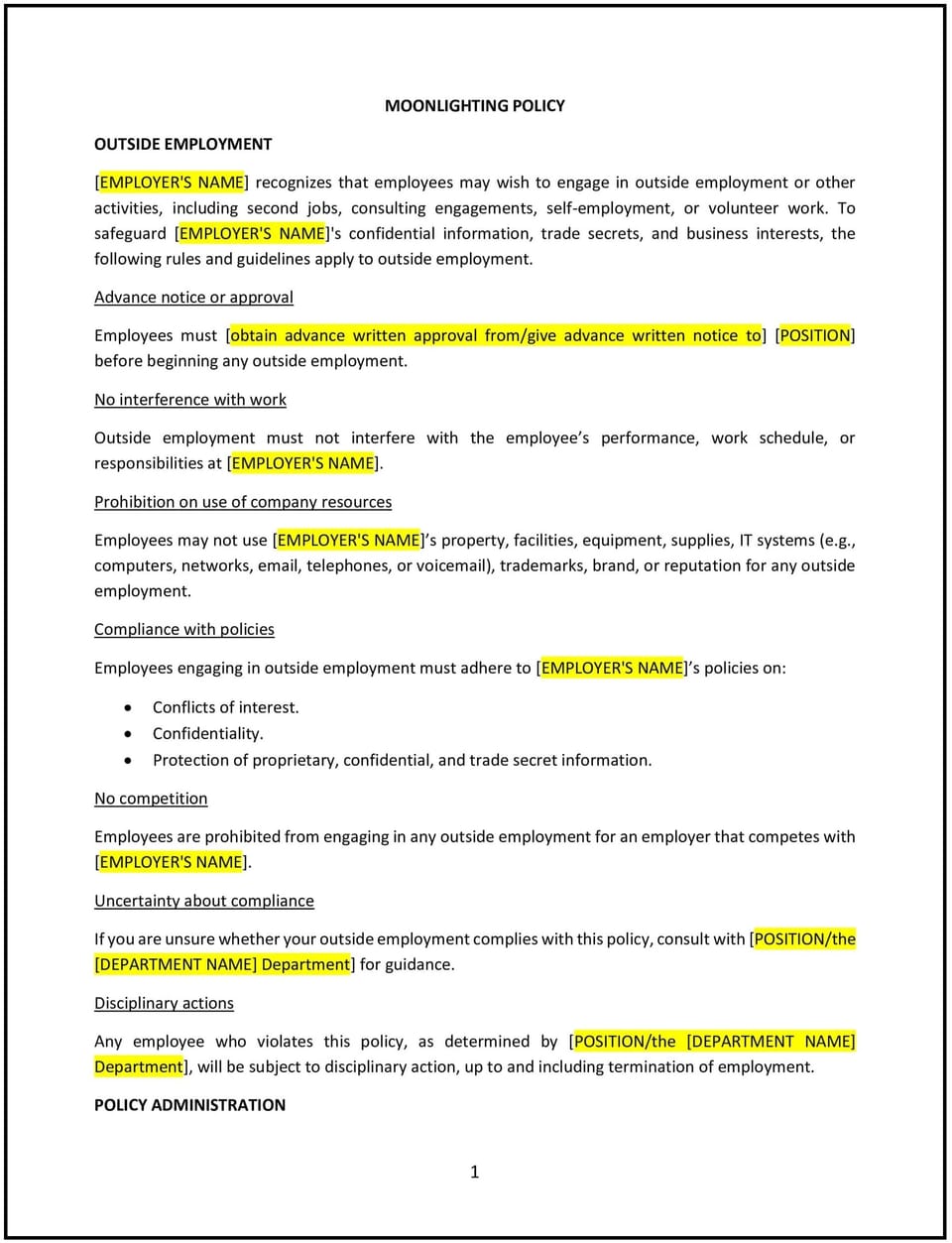Moonlighting policy (Arkansas): Free template

Moonlighting policy (Arkansas)
In Arkansas, a moonlighting policy provides businesses with guidelines for employees engaging in secondary employment outside their primary job. This policy establishes expectations to prevent conflicts of interest, ensure productivity, and protect the business’s confidential information.
This policy outlines acceptable and prohibited secondary employment, disclosure requirements, and consequences for violations. By implementing this policy, Arkansas businesses can promote transparency, protect their interests, and support compliance with labor regulations.
How to use this moonlighting policy (Arkansas)
- Define acceptable secondary employment: Clearly outline what types of secondary jobs are permissible, focusing on roles that do not conflict with the business’s interests or affect performance.
- Require disclosure: Specify that employees must disclose any secondary employment and obtain prior approval if required by the business.
- Address conflicts of interest: Include provisions to prevent moonlighting roles that compete with the business, create time conflicts, or involve confidential information.
- Communicate expectations: Ensure employees understand the importance of maintaining productivity and fulfilling their primary job responsibilities.
- Enforce consistently: Apply the policy uniformly to all employees and document any approvals or disciplinary actions to ensure fairness.
Benefits of using this moonlighting policy (Arkansas)
This policy offers several advantages for Arkansas businesses:
- Protects business interests: Prevents conflicts of interest and safeguards confidential information from being misused in secondary employment.
- Promotes transparency: Encourages open communication about secondary employment to avoid misunderstandings or disputes.
- Supports compliance: Aligns with Arkansas labor laws, ensuring lawful handling of moonlighting issues without infringing on employee rights.
- Maintains productivity: Ensures that secondary jobs do not negatively impact employees’ performance in their primary roles.
- Reduces workplace disputes: Provides a clear framework for addressing potential conflicts related to moonlighting activities.
Tips for using this moonlighting policy (Arkansas)
- Address Arkansas-specific considerations: Ensure the policy reflects state labor laws and protects both the business’s interests and employees’ rights.
- Provide examples: Include scenarios of acceptable and prohibited secondary employment to clarify expectations.
- Train managers: Educate supervisors on how to handle disclosures and identify potential conflicts of interest.
- Document thoroughly: Maintain records of all disclosed secondary employment, including approvals or rejections, to ensure transparency and consistency.
- Review periodically: Update the policy to reflect changes in laws, industry practices, or business needs.
Q: How does this policy benefit the business?
A: This policy protects the business from conflicts of interest, safeguards confidential information, and ensures employees remain productive in their primary roles.
Q: What types of secondary employment are prohibited?
A: Secondary jobs that compete with the business, create time conflicts, or involve the use of confidential business information are typically prohibited under this policy.
Q: How does this policy align with Arkansas labor laws?
A: The policy supports compliance with Arkansas labor laws by balancing the business’s interests with employees’ rights to pursue secondary employment.
Q: What steps should employees take to disclose secondary employment?
A: Employees should provide written details about their secondary job, including the employer, role, and hours, for review and approval as required by the policy.
Q: How can the business address violations of this policy?
A: The business should investigate potential violations, document findings, and apply appropriate disciplinary actions, such as warnings or termination, based on the severity of the issue.
This article contains general legal information and does not contain legal advice. Cobrief is not a law firm or a substitute for an attorney or law firm. The law is complex and changes often. For legal advice, please ask a lawyer.


